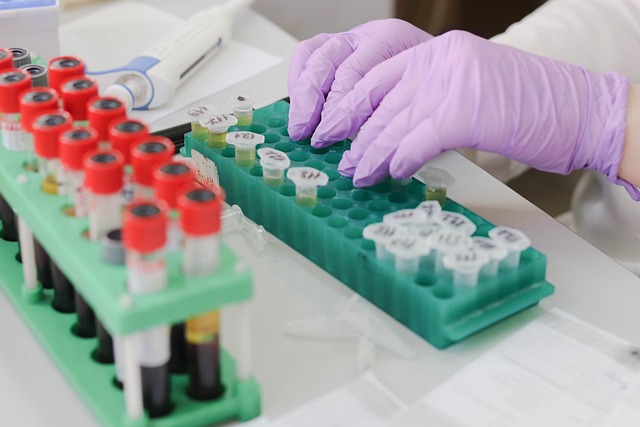Cholesterol blood tests are essential tools for proactive health management as they detect 'bad' LDL cholesterol and 'good' HDL levels, indicating cardiovascular risk. Regular testing, now more accessible due to affordable options, empowers individuals to track their heart health, make informed lifestyle choices, and prevent diseases like atherosclerosis. Interpret results alongside overall health to guide necessary lifestyle adjustments or medical interventions.
Staying on top of your health involves regular cholesterol blood tests. Understanding your cholesterol levels is crucial for maintaining optimal well-being, as high or low readings can indicate potential risks. This article guides you through the process, starting with explaining the significance of cholesterol and why routine testing matters. We then explore affordable options, making it accessible for everyone to monitor their health. Learn how to interpret results and take proactive steps towards a healthier lifestyle.
- Understanding Cholesterol and Why Regular Testing Matters
- Exploring Affordable Options for Cholesterol Blood Tests
- How to Interpret Your Cholesterol Results and Stay Healthy
Understanding Cholesterol and Why Regular Testing Matters
Cholesterol is a waxy substance found in our bodies, essential for building cell membranes and producing hormones. However, it’s also a major contributor to cardiovascular disease when levels become unbalanced. There are two main types: HDL (high-density lipoprotein), often referred to as ‘good’ cholesterol, which helps remove LDL (low-density lipoprotein) or ‘bad’ cholesterol from the bloodstream; and triglycerides, a type of fat in the blood that can increase heart disease risk if levels are too high.
Regular cholesterol blood testing is crucial for maintaining optimal health, as it allows individuals to track their cholesterol levels over time and take proactive measures to manage their cardiovascular risk. Detecting elevated LDL or low HDL early on enables lifestyle adjustments and, if necessary, medical intervention to prevent the progression of atherosclerosis (hardening and narrowing of arteries) and reduce the chances of heart attack or stroke. Affordable cholesterol blood tests make this crucial monitoring accessible to a wider population, empowering folks to take control of their long-term health.
Exploring Affordable Options for Cholesterol Blood Tests
Cholesterol blood tests are essential tools for regular health monitoring, helping individuals track their cardiovascular risk factors. However, the cost of these tests can be a barrier to frequent checking. Fortunately, exploring affordable options has never been easier. Many healthcare providers now offer discounted rates and packages specifically designed for routine cholesterol screening.
Online clinics and pharmacy chains frequently promote budget-friendly cholesterol blood tests, making them more accessible than ever. Additionally, some insurance plans cover these tests without additional costs, allowing members to take advantage of regular monitoring without financial strain. By keeping an eye on cholesterol levels, individuals can make informed decisions about their health and lifestyle choices.
How to Interpret Your Cholesterol Results and Stay Healthy
Understanding your cholesterol levels is a crucial step in maintaining optimal health. When you get a cholesterol blood test, the results will typically include measurements for LDL (low-density lipoprotein), HDL (high-density lipoprotein), and total cholesterol. LDL, often referred to as ‘bad’ cholesterol, can build up in your arteries, increasing the risk of heart disease. High levels of LDL should be addressed through lifestyle changes or medication. On the other hand, HDL is known as ‘good’ cholesterol; it helps remove LDL from your bloodstream. Higher HDL levels are desirable and protective against cardiovascular issues.
To stay healthy, interpret your results in conjunction with your overall health profile. A single cholesterol test is just a snapshot, so regular monitoring is key to tracking progress. If you have concerns or your results indicate elevated cholesterol, consult a healthcare professional who can guide you on lifestyle adjustments like diet and exercise, or recommend appropriate medical interventions if necessary. Regular health check-ups, including cholesterol blood tests, empower you to take charge of your well-being.
Regularly monitoring your cholesterol levels through affordable cholesterol blood tests is a proactive step towards maintaining overall health. By understanding your results, you can make informed decisions to improve your lifestyle and manage your cholesterol effectively. With various accessible testing options available, there’s no better time to take control of your well-being and stay ahead of potential health issues.
